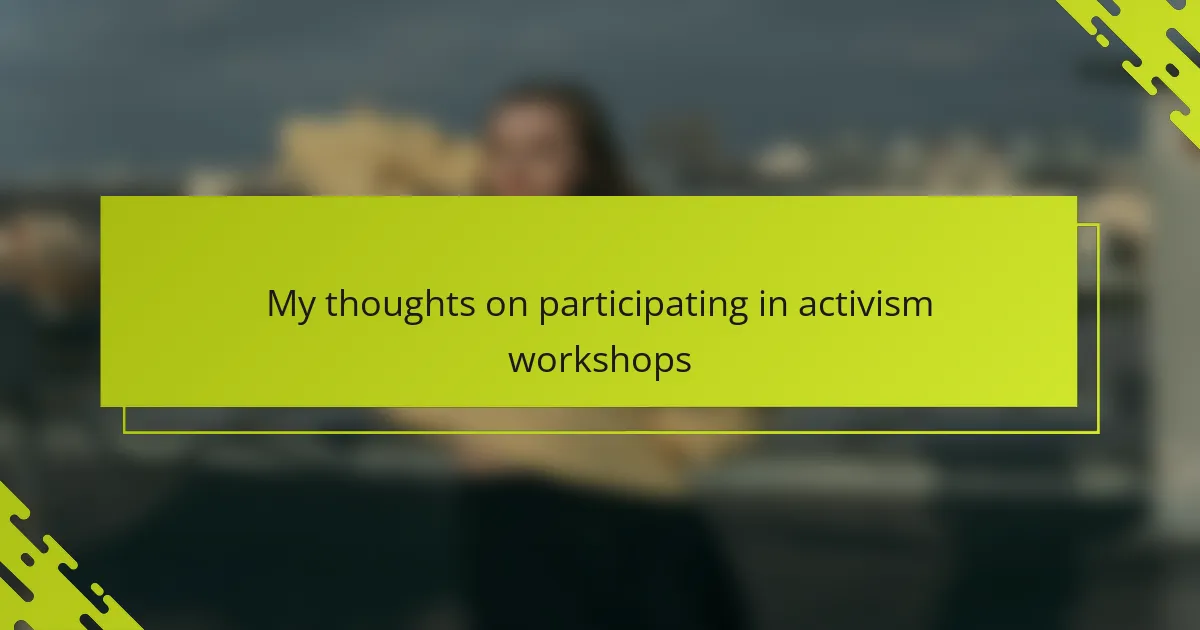Key takeaways
- Activism workshops provide practical tools for advocacy while fostering emotional connections and self-reflection among participants.
- Engagement in queer women culture emphasizes resilience, creativity, and the importance of belonging in diverse communities.
- Choosing the right workshop is vital; it should balance practical skills with personal connection to enhance the activist journey.
- Applying activism skills in daily life leads to greater awareness, intentionality, and the integration of activism into everyday interactions.
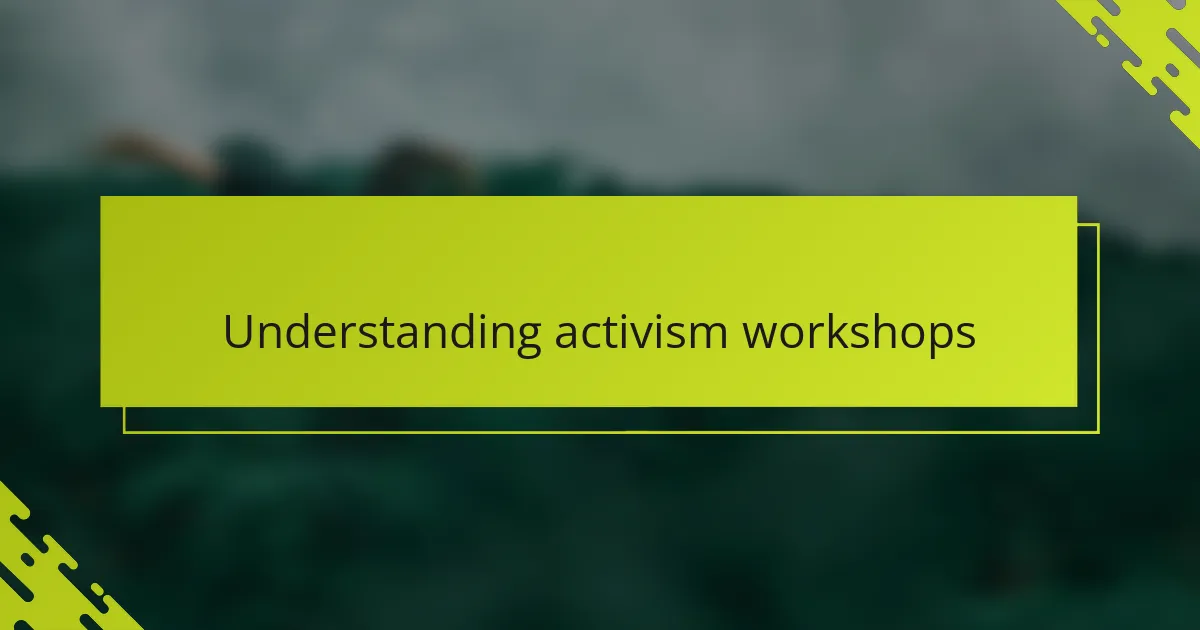
Understanding activism workshops
Activism workshops are spaces designed to equip participants with practical tools and knowledge to advocate for change. When I first joined one, I was surprised by how much I learned about organizing, communication, and community building—skills I didn’t even know I needed. Have you ever wondered what actually happens in these sessions beyond the usual speeches and slogans?
What struck me most is the sense of connection that workshops foster. It’s not just about information; it’s about sharing experiences, frustrations, and hopes with people who truly get it. This emotional exchange often turns into a powerful motivator, making the work feel meaningful and urgent.
I also noticed how these workshops challenge you to reflect on your own role within larger movements. They encourage asking tough questions like: How can I contribute effectively? Am I listening enough to marginalized voices? That kind of introspection deepened my understanding of activism far beyond theory.
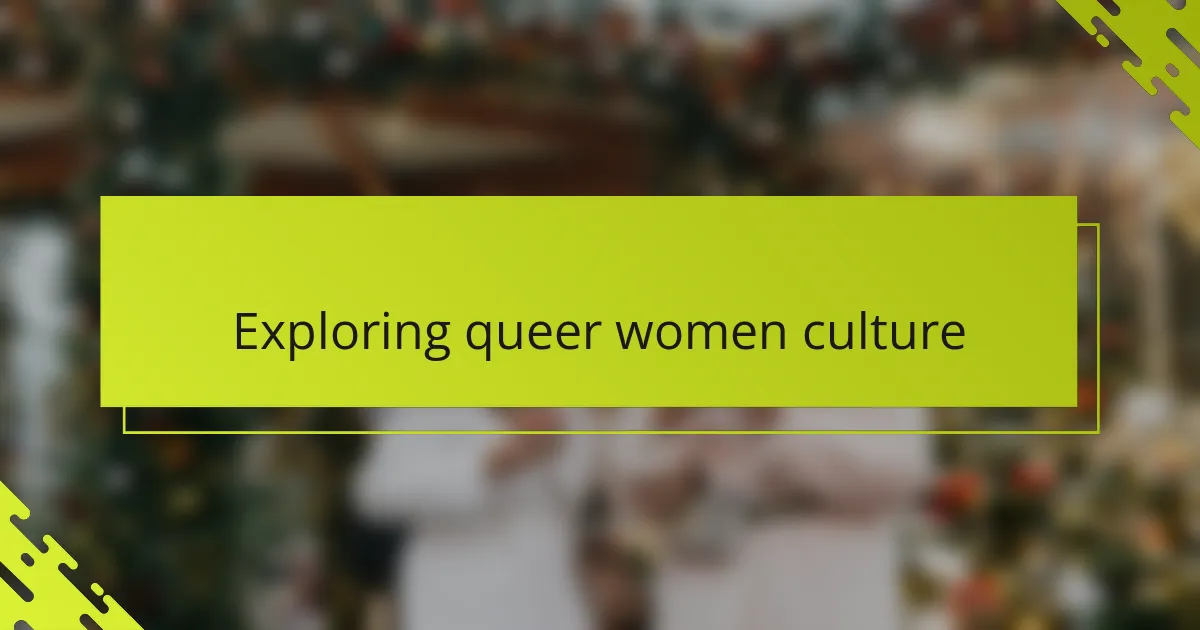
Exploring queer women culture
Exploring queer women culture has always felt like stepping into a vibrant, layered world where identity and expression are continuously reshaped. When I first immersed myself in these spaces, I was amazed by how deeply stories of resilience and creativity intertwined with everyday life. Have you ever noticed how simply being present in queer women communities can reveal nuances of culture that mainstream narratives often overlook?
What really resonated with me is how queer women culture isn’t static—it’s a dynamic blend of art, activism, and personal journeys. For instance, attending local queer poetry nights or craft gatherings showed me how culture is a form of resistance and healing all at once. These moments feel intimate yet powerful, like a shared heartbeat that connects everyone.
I often reflect on how exploring this culture has expanded my own sense of belonging. It pushes me to question not only who I am but how I relate to others embracing different identities and experiences. Doesn’t that make you wonder how much richer our perspectives become when we engage deeply with communities beyond our own?
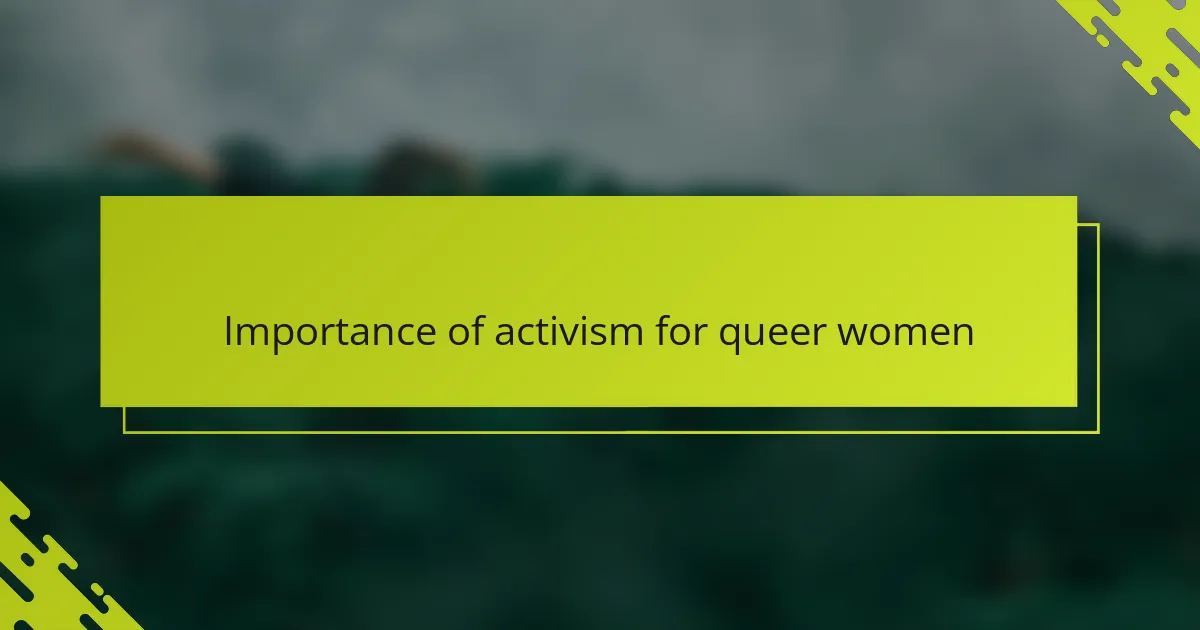
Importance of activism for queer women
Activism is essential for queer women because it creates spaces where our voices can finally be heard and valued. I remember feeling invisible for so long, and participating in activism felt like stepping into a spotlight that wasn’t blinding but empowering. Have you ever experienced the relief of finding a community that fights alongside you rather than against you?
What’s more, activism isn’t just about protesting or making demands—it’s about building resilience and rewriting narratives that have often erased us. When I take part in these efforts, I feel like I’m contributing to a legacy of courage and change that uplifts not only myself but generations to come. Doesn’t it feel incredible to be part of something bigger than yourself?
Activism also teaches us the importance of solidarity, reminding me time and again that our struggles are interconnected. Through workshops and collective action, I’ve seen how building bridges between diverse queer women fosters strength and hope. Have you noticed how those connections turn isolated battles into shared victories?
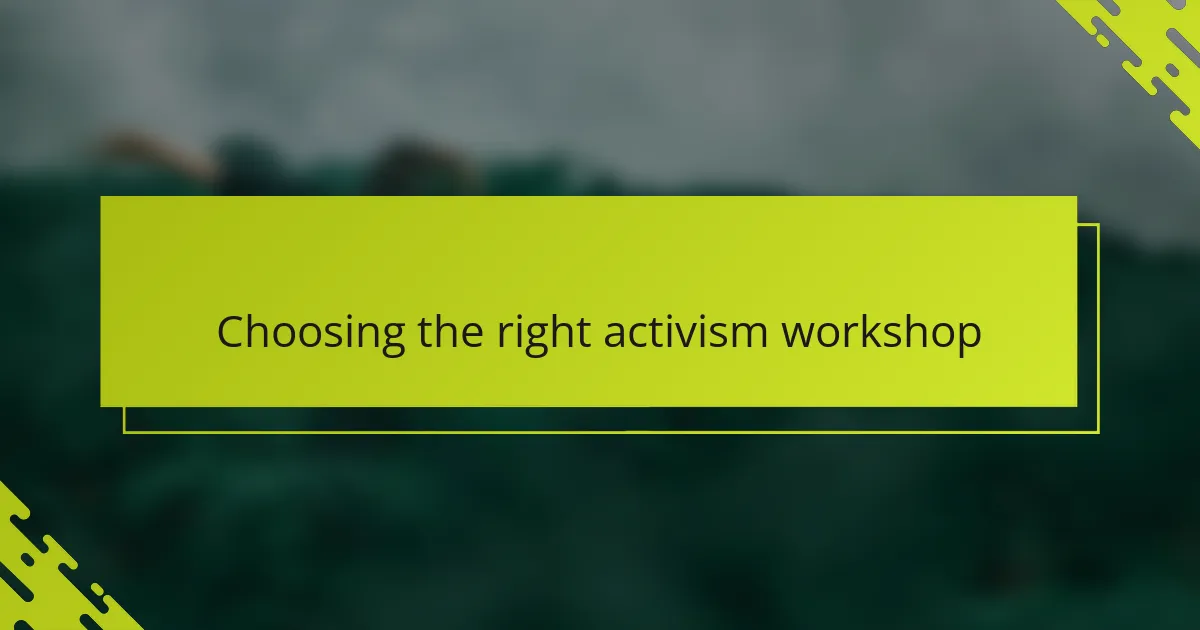
Choosing the right activism workshop
Picking the right activism workshop felt like choosing a careful path in a crowded forest. When I attended one focused specifically on queer women’s issues, the discussions immediately clicked with my experiences—something I hadn’t found in more general spaces. Have you ever walked into a room and just known it was where you belonged?
I’ve learned that workshops vary widely—not just in topics but in energy and approach. Some are deeply reflective, encouraging personal storytelling, while others are more action-oriented, focused on strategy and outreach. What kind of environment do you thrive in when learning to activate change?
For me, the best workshops balance practical skills with emotional connection. One time, after a workshop, I left not only with new tools but also feeling seen and supported by others who shared my struggles and hopes. Isn’t that combination what makes the journey of activism truly sustainable?
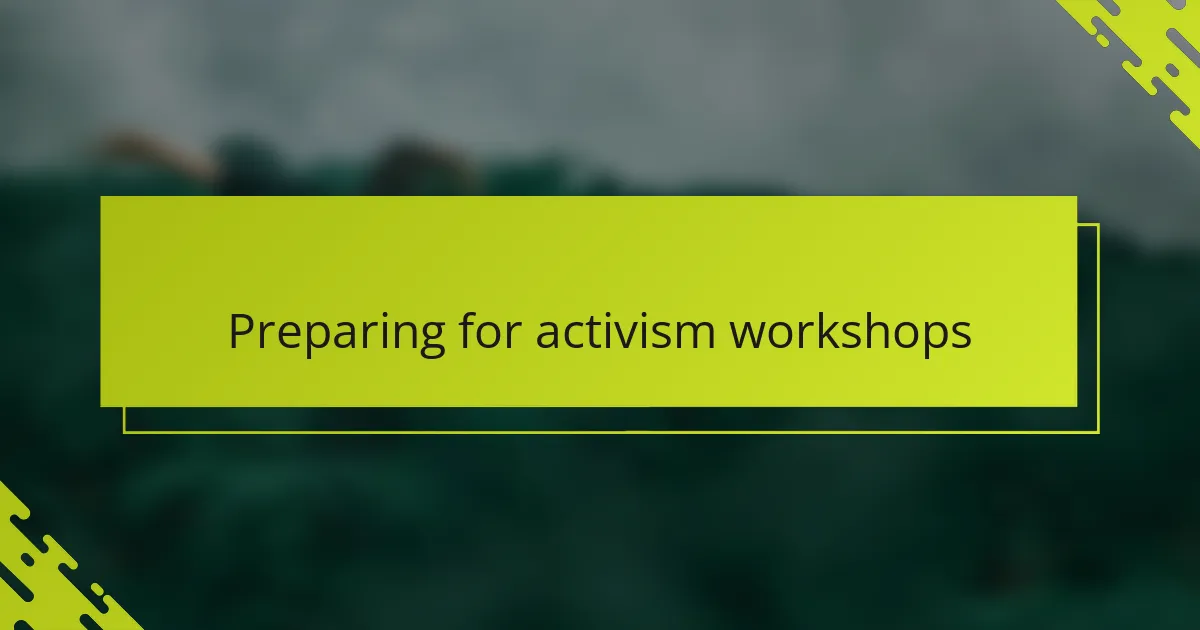
Preparing for activism workshops
Preparing for activism workshops means more than just showing up; it’s about mentally and emotionally readying yourself for deep engagement. I remember feeling a mix of excitement and nervousness before my first session, unsure of what to expect but determined to learn and connect. Have you ever had that mix of anticipation and uncertainty before stepping into a new, charged space?
Gathering some basic knowledge beforehand helped me feel grounded. Reading up on the specific issues the workshop would address made the discussions more meaningful and less intimidating. Do you think a little homework could transform your experience from overwhelming to empowering?
It’s also crucial to think about your personal boundaries and self-care going in. Activism can be intense, and I learned the hard way that pacing myself—taking breaks and being honest about my limits—made all the difference. How do you ensure you stay energized and centered when the work feels heavy?
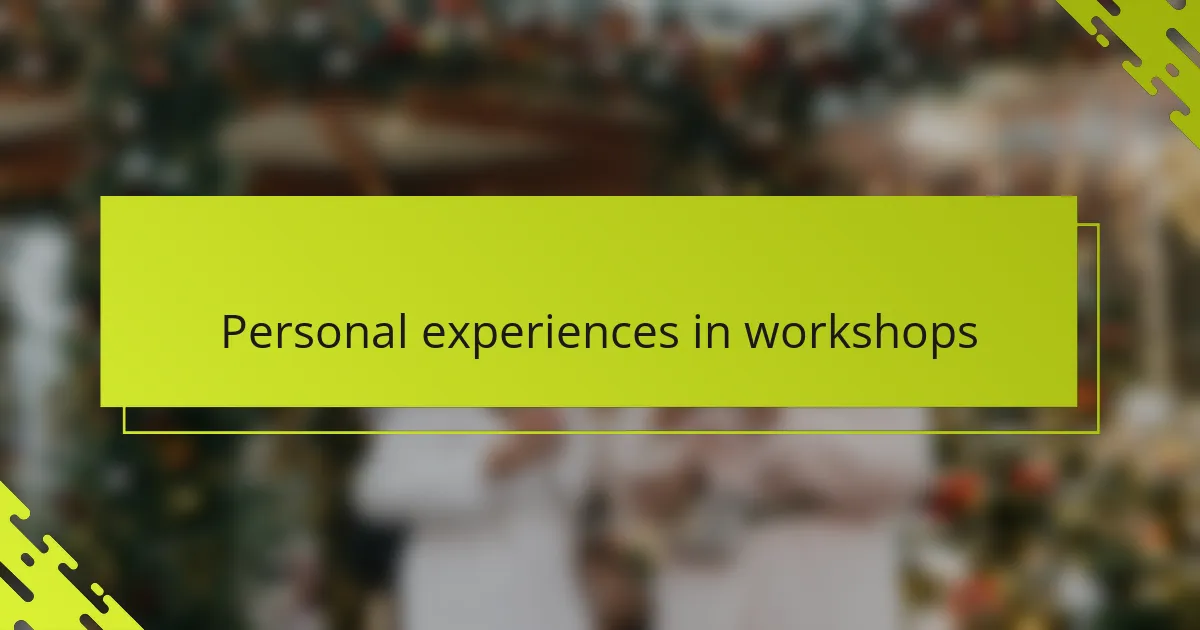
Personal experiences in workshops
One workshop I attended really stuck with me because it wasn’t just about theory—it was about real stories. Hearing others share their journeys reminded me how diverse our paths are and how much we all carry with us. Have you ever felt that moment when someone’s experience echoes your own in a way words usually can’t capture?
Sometimes, the exercises pushed me out of my comfort zone, forcing me to confront my own biases and assumptions. It was uncomfortable but necessary, and I left feeling a little more honest with myself. Isn’t it strange how discomfort often leads to the most growth?
I recall one session where we created action plans together, and the energy in the room was electrifying. Collaborating face-to-face with people who genuinely cared made the ideas feel alive, not just academic. Have you noticed how hands-on involvement changes the whole experience compared to passive learning?
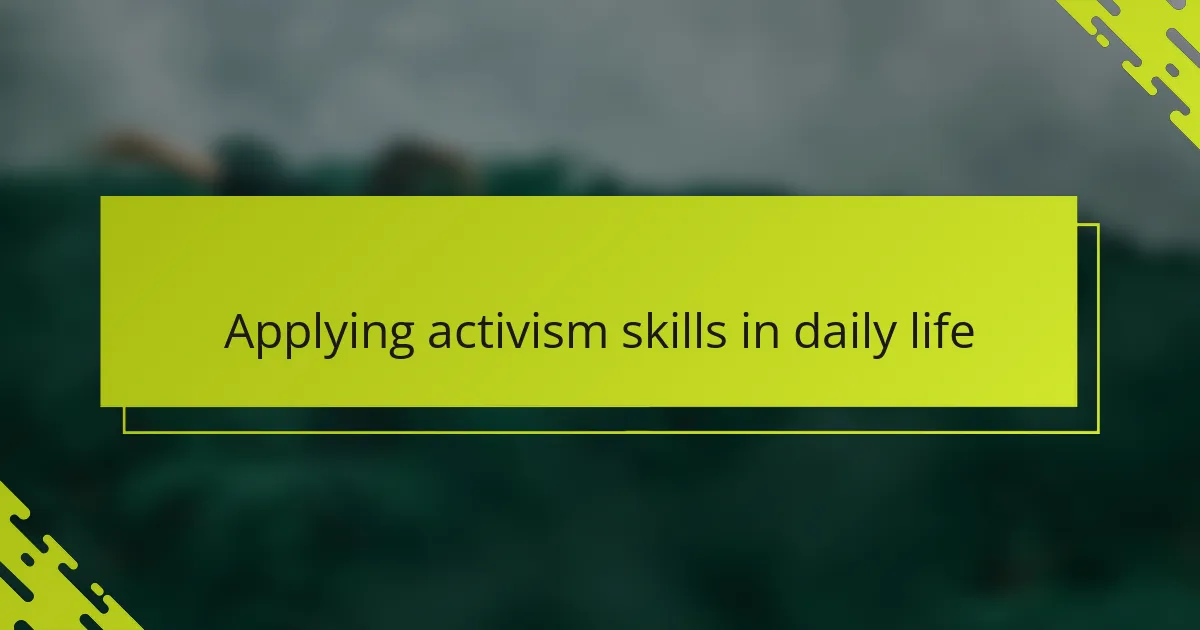
Applying activism skills in daily life
Applying the skills I gained from activism workshops to daily life has been surprisingly empowering. For example, simple conversations at work or with friends have become opportunities to practice active listening and to challenge assumptions gently. Have you ever noticed how those small moments can ripple into bigger changes when handled thoughtfully?
I also find myself more intentional about recognizing and calling out microaggressions or exclusionary behavior in everyday settings. It’s not always easy—I’ve stumbled or felt unsure—but using communication techniques from workshops helps me stay grounded and clear without escalating tension. Doesn’t it feel good when you can stand firm yet remain approachable?
Sometimes, the organizing skills come into play in more creative ways, like planning community gatherings or supporting local queer events. Taking initiative in these small acts feels like applying activism beyond protests—embedding it into the rhythms of everyday life. How often do you think about weaving activism into your routine, rather than seeing it as a separate task?
